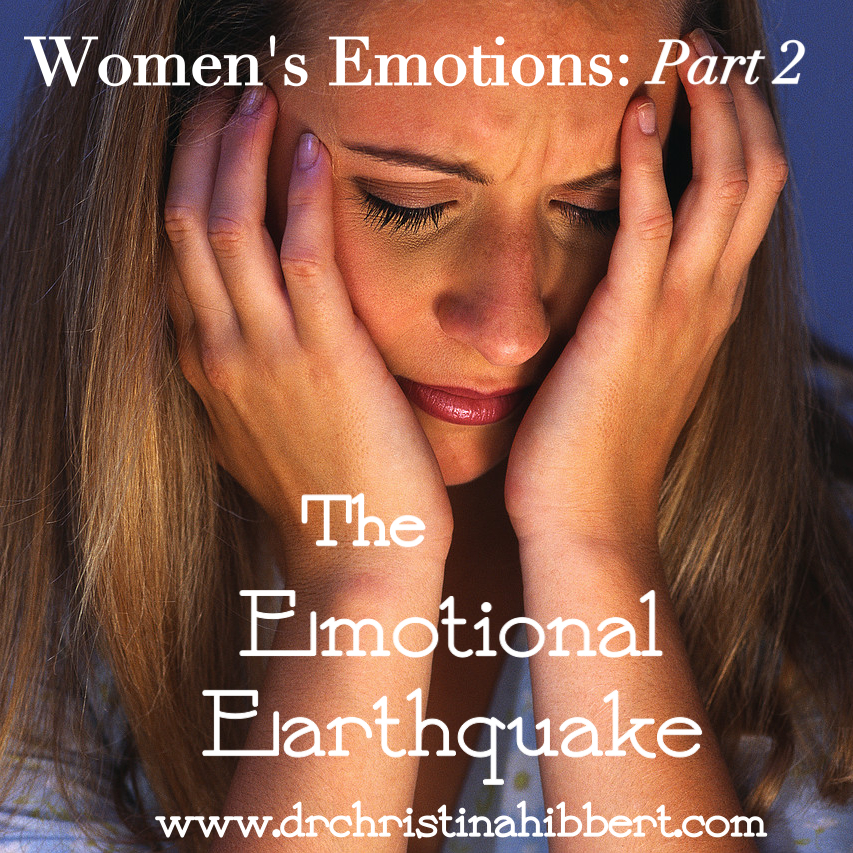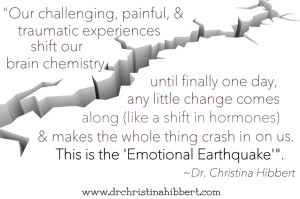
21 Apr Women’s Emotions: Part 2, The Emotional Earthquake
Women’s Emotions: Part 2
The Emotional Earthquake
Welcome back to the “Women’s Emotions” series. I hope you’ve already gained a little more insight into how women’s emotions work (or don’t work).
If you haven’t had a chance to read the Introduction and Part 1 yet, you may choose to do so, because today we will be building upon the basics explained in the first two segments as we examine how our brains, hormones, and life experiences can combine to create “tremors” and “earthquakes” in our emotional health.
The Earthquake Theory
I learned about the “Earthquake Theory” years ago from the amazing book, Women’s Moods¹. I use it all the time to help women (and the men who love them) better understand their own occurrence of emotional illness. Often, a woman will sit with me and explain, “I’ve never had any kind of depression or anxiety. Now I’m a mess! It feels like it came out of nowhere and I don’t understand why!” The earthquake theory can quickly clear things up.
Understanding Tremors & Earthquakes
As we learned in Part 1, our brains, hormones, and life experiences are connected and influence one another to create our overall  experience of emotional health. So what happens when any one of these components is put under extreme stress?
experience of emotional health. So what happens when any one of these components is put under extreme stress?
Think of a “real” earthquake. Before it happens, the ground is shifting, little bits at a time, without any indication on the surface of what is happening below. The same goes for us.
Whenever our brain, hormones, or life experiences are stressed or altered, those changes will affect the other two components and can cause significant changes in our experience of emotional well-being, what I call either a “tremor” or an “earthquake. Our challenging, difficult, painful, and traumatic experiences shift our brain chemistry until finally one day, any other little change can come (like a shift in hormones) and make the whole thing crash in on us! This is the emotional earthquake.
Emotional Tremors
A “tremor” is what we call any minor changes in emotional health—mild depressive symptoms, anxiety, irritability, or even Premenstrual Syndrome (PMS)—that lasts for a few days or weeks at most but doesn’t significantly impair overall functioning. For example, when your hormones shift just before your period, they cause changes in your brain chemistry (since the two are directly linked—see part 1). For many women these changes will in turn affect not only mood but will also increase stressful life experiences around that time. On the flip side, a woman who has a history of stressful life experiences (which also alter the brain chemistry—see part 1) may suddenly find that she becomes emotionally dysregulated when she gets her period or goes on a hormone-based contraception, the changes in hormones setting off the “tremor” that was already primed to happen.
Women experiencing a tremor will feel “normal” again in time and without intervention.
Emotional Earthquakes
But experiencing tremors over and over can cause even greater stress on the brain. In fact, we usually fail to recognize just how much our history of tremors, life stress, and hormone shifts can set us up for future emotional meltdowns. Just like a real earthquake, once our brain chemistry is shifted over and over all it may take is one more shift and “boom!” we have an emotional earthquake.
Case Example
Let me see if I can make this a little clearer by sharing a case example—my own.
My mom was diagnosed with cancer for the first time when I was 15. Then my youngest sister, Miki, was diagnosed with cancer when I was 16. My mother made it into remission, but my then-8 year-old sister died when I was 18. These life experiences, combined with my still-adjusting teenage hormones, led to a “tremor”—what felt like mild depression for a few months but was probably really bereavement.
I came out of the tremor and felt fine until a few years later when I got married (which is a significant life stressor, even my husband agrees!) and we decided to get pregnant. While I was pregnant my mom was diagnosed with breast cancer again. My husband was preparing for dental school and working full-time, I was taking care of my mom and “being mom” for my siblings, and everything seemed fine—until the baby was born (major shift in hormones!). I gave birth to our first baby one year after our wedding and surprise! I got a baby boy and Postpartum Depression (which is definitely an earthquake). It may have seemed, at the time, like the postpartum depression came out of nowhere (it sure felt that way!) but looking back it made perfect sense. All those difficult life experiences combined with major shifts in my hormones, and my brain simply couldn’t take it anymore.
Aha!
Learning about the earthquake theory is often the “aha!” we women have been searching for, for it helps us understand our emotional shifts just a little bit better. When we can see all that goes into our emotional tremors and earthquakes we can find comfort knowing that there is a very real reason for the changes in our emotions, that things aren’t always as they appear on the outside. It can also motivate us to take better care of ourselves in order to prevent re-occurring earthquakes in our lives.
I hope you will continue to join me in my “Women’s Emotions” series to learn more about what we can do to prevent emotional earthquakes or overcome them at each stage and phase of life. I welcome your comments, questions, and feedback, so please leave me a message below or through email if you desire. I wish you the best in understanding and creating your experience of emotional well-being and look forward to meeting you again soon in this place where “really great people” meet!
To SUBSCRIBE to this blog or updates, please fill out the form to the right.
¹ Sichel, D. & Driscoll, J.W. (1999). Women’s Moods: What every woman must know about hormones, the brain, and emotional health. Harper Collins, New York, NY.

[…] through the ringer” (for more on the psychological impact of these experiences, read “Women’s Emotions: The Emotional Earthquake” article). This means that, once they finally do conceive, many are entering pregnancy with […]
I truly admifrom your work Dr. Hibbert, it gives me comfort. Hope you continue your work, you have no idea how this has helped me. Thank you for the knowledge I’ve gained on the feminine emotions and brain, I really needed it. I look forward to reading more of your work!